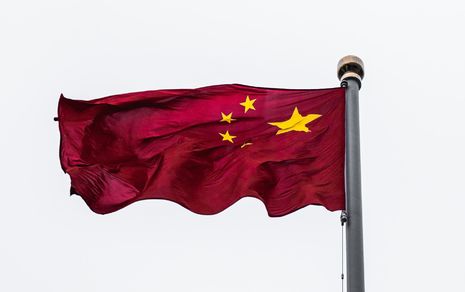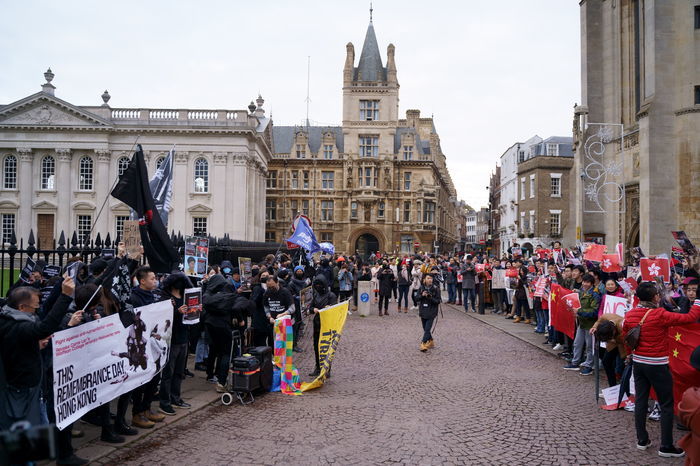Red star to black sun: China’s descent into fascism
Against the backdrop of Umberto Eco’s “Ur-Fascism”, Sam Hudson explores how China, under Xi Jinping, has become a fascist state

Content Note: Contains mention of genocide
In the recent Union debate on the global resurgence of fascism, I was struck by the total omission of China from the debate by all six speakers. This is symptomatic of a wider trend that overlooks China’s politics and rhetoric in favour of its overtly red aesthetics. From the genocide of Uighurs in Xinjiang to chauvinistic posturing on its borders, Xi Jinping’s China resembles fascist Italy, Germany and Japan far more closely than it does the post-Stalinist Soviet Union.
The roots of China’s descent into fascism can be traced back to Deng Xiaoping’s ascent to power and economic reforms that openly rejected central planning in favour of market-based economics. These reforms were instrumental in not only achieving China’s rapid economic growth, but also in ensuring a place on the world stage, through opening up the country to global markets. On the surface, these reforms relinquished state power over the economy; but by allowing private enterprise, they laid the foundations for an economy similar to those found in the fascist countries of the 1930s and 40s.
“If Dengism laid the economic roots for the development of Chinese fascism, it is Xi Jinping that allowed it to blossom”
As shown by China’s treatment of Jack Ma and Alibaba, the Chinese state wields enormous power over businesses to help further cement its grip over the population. A core facet of fascism is the weaponisation of capitalism to help further the authority and interests of the government. As opposed to Soviet-style centrally planned economics, fascists are quite content with the development of private monopolies and the conglomeration of private businesses, enriching their owners – as long as it is in the interest of the government to do so. The tolerance of the Zaibatsu by the Imperial Japanese Militarist Government, and the Nazi’s open support of powerful monopolies in Germany such as IG Farben, Krupp and Rheinmetall, pay testament to this. China’s economy is far closer to this form of fascistic weaponised capitalism, tolerating powerful monopolies such as Huawei as long as they continue to silently pledge fealty, than it is to a market-reformed Soviet Union along the lines of Gorbachev’s perestroika.
If Dengism laid the economic roots for the development of Chinese fascism, it is Xi Jinping that allowed it to blossom. In 1995, Umberto Eco provided one of the most comprehensive definitions of fascism in his essay “Ur-Fascism.” By looking at China’s adherence to the properties that were laid out in his essay, we can quickly see that the Chinese government is at heart, fascist.
The first property of Ur-Fascism, a syncretic “Cult of Tradition,” was embraced by Xi Jinping at the start of his rule and has only strengthened since. President Xi’s promotion of traditional Confucianism blended with socialist rhetoric flies in the face of Mao’s infamous Cultural Revolution that sought to end traditionalist thinking and values in China, and shows a clear departure from the authoritarian system of socialism imposed by Mao. Much like the “Mare Nostrum” myth of Italy or Aryanist myth of Germany, this cult of tradition reforges China’s national myth to hark back to a mythic, great, imperial past. Before Xi, China’s myth was characterised by a common revolutionary narrative that celebrated the triumph of the worker and the peasant over systems of capitalist oppression. This national myth has since become irrelevant and unrelatable to many, as China’s middle class has burgeoned, forcing a transition to a new one. In fact, appealing to a frustrated middle class is Eco’s sixth property of Ur-Fascism. Similar to Japanese ultranationalism, Chinese fascism itself engenders feelings of frustration in an otherwise content middle class by weaving an element of political humiliation into its own myth that it seeks to then solve.
“We can no longer treat China as a remnant of the Cold War, the Soviet Union that could-have been”
Like Japan’s “Asia for Asians” myth, the new national myth proposes that China’s historical greatness was unjustly undermined by the imperialist slights of European powers through China’s “century of humiliation,” and that expansionist and imperialist foreign policy is justified by righting historical wrongs. In the eyes of the Chinese fascist, until all these historical wrongs are righted, China’s humiliation continues and “national rejuvenation,” Xi Jinping’s ultimate goal, cannot be achieved. This framework explains China’s eagerness to reclaim and integrate historical core territories such as Hong Kong and Taiwan with disregard for international ramifications.
In China, disagreement with the government and the national myth becomes treasonous by virtue of extending the “Century of Humiliation,” yet another property of Eco’s definition. Protesters in Hong Kong were smeared as “CIA moles” by much of Chinese media because, in their eyes, rejecting the government only continues China’s humiliation by the West – and therefore there is no reason why a Chinese citizen will reject the government unless they are disloyal.
This idea of national humiliation that is prolonged and furthered by Western infiltration has lead to “an Obsession with Plot”, much like the “Stab-in-the-Back” myth of Nazi Germany. This has led to a surge in “statist” jurists who support an expansive view of state authority that prioritises stability of the nation above all else, for external threats cannot be properly defended against otherwise. Statists have been heavily influenced by the work of Carl Schmitt, Hitler’s “Crown Jurist”, who articulated very similar views that sought to defend against a supposed “plot” against the German state and people. This has justified dystopian surveillance infrastructure and methods, such as the social credit system, in addition to the ongoing persecution and genocide of minorities such as the Uighurs. National security, in their eyes, must be prioritised above all else.
Pulling back the red veneer of China’s government lays bare a dark reality: that the world’s second superpower is a fascist one. We can no longer treat China as a remnant of the Cold War, the Soviet Union that could have been. The policy of “national rejuvenation” is setting China on a collision course between America and itself, for the tacit goals of the Chinese government cannot be achieved without significant concessions that would significantly diminish America’s global standing. America may pursue its own imperial agenda but it is certainly the preferable superpower to China, given its somewhat flawed yet broadly democratic institutions. War is not an inevitability and fascist domination can still be countered – after all, America still overshadows China when it comes to global power. We cannot, however, continue to delude ourselves that China is an amicable business partner in pursuit of mutual benefit.
 Features / How sweet is the en-suite deal?13 January 2026
Features / How sweet is the en-suite deal?13 January 2026 Arts / Fact-checking R.F. Kuang’s Katabasis13 January 2026
Arts / Fact-checking R.F. Kuang’s Katabasis13 January 2026 News / Uni members slam ‘totalitarian’ recommendation to stop vet course 15 January 2026
News / Uni members slam ‘totalitarian’ recommendation to stop vet course 15 January 2026 News / SU sabbs join calls condemning Israeli attack on West Bank university13 January 2026
News / SU sabbs join calls condemning Israeli attack on West Bank university13 January 2026 Comment / Will the town and gown divide ever truly be resolved?12 January 2026
Comment / Will the town and gown divide ever truly be resolved?12 January 2026











